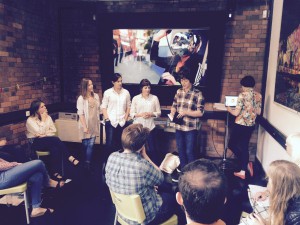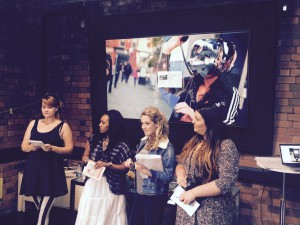Day one
Day one of the new Future Producers 2015 opened with a focus on play. The morning was run by the dynamic duo Jon Atkin and Sham Ahmed with the key purpose of getting to know each other. It is fundamental that over the next three months the group of 16 young producers can work as a team, build trust and cooperate. The group will be collaborating on the delivery of live briefs that will form part of the autumn season at Watershed, so good communication and listening skills are crucial. In the traditional style of Future Producers we kicked off with the marshmallow tower and chubby bunnies, I never realised that marshmallows allowed for such fun.
The afternoon continued with some more focused fun with Playable City producer Hilary O’Shaughnessy. The playable city workshop got the group responding to mini briefs that touched on some important themes that will run throughout the Future Producers programme. They were asked to consider a location and audience to drive an idea. From this quick fire workshop the group came up with some interesting ideas that saw car parks turned into playgrounds of screens, interactive bus stop fun and large projections of selfies.
Day Two
Day two opened with a talk from independent creative producer Amy Martin on the role of a producer. Her presentation style was satisfyingly relaxed and hugely informative, here are some things to consider on the role of a producer:
- A producer needs resilience
- A producer requires practical production skills
- A producer must be able to let go and trust a team
- A producer has a responsibility to their audience
- A producer must consider the aesthetics and know why an idea is good
- Whose idea is being produced – your own, others or a collaborative effort
- Collaboration is essential when producing
- Why not keep an ideas book
- Borrow from different art forms and sectors
- Always have the end in mind
And here are some inspiring quotes from Amy:
If the art form was a car the creativity would be the fuel
Creativity is by definition closely related to bravery, because it requires the creator to share a unique, personal idea, exposing themselves to potential judgement
Nothing else in the world is as powerful as an idea whose time has come
http://creative-producing.tumblr.com
www.youthleadership.com
After lunch REACT Managing Producer Jo Lansdowne ran an incredibly valuable workshops that explored public speaking. For most of us having to stand up in front of an audience fills us with fear, here are Jo’s top tips to getting up there and giving it our best:
- Hold you nerve
- Know your audience
- Tell your story
- Keep to time
- Don’t leave loose ends
- This is a beginning of a conversation
- Less is more
The weekend ended with an introduction to the three live briefs from the Watershed staff:
- 24 and under ticket offer in response to a collaborative research project with Culture24
- LOVE Tea Dance with a Difference, as part of Bristol Family Arts Festival
- A series of late night screening sinspired by the BFI LOVE season
The group now have two weeks to come up with an idea to pitch to an external panel of producers. Good Luck.



